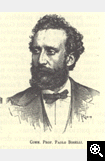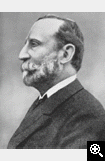|
|
|
| |
| |
Paolo Boselli
| |

 |
|
was born in Savona on 8th June 1838. He got his degree in 1860, at the faculty of law of the University of Turin. Then Boselli started his forensic career.
In 1862 Boselli got, through a public competition, a seat as auditor at the Council of State. This way he could know Francesco Cordova, that at those times was the Minister of Agriculture, who appointed him as a general secretary of the Italian Commission at the Universal Exhibition in Paris. In the same year Boselli became a preserver of collections at the Royal Industrial Museum, whose later he became the president.
Entrusted in 1869 with the chair of Finance at the University of Rome, Boselli later left the teaching to fully devote to the political activity. He mainly looked after the problem of the economic and industrial growth in the Country and of problems related to the technical and scientific education.
Candidate in the electoral body of Savona, Boselli was appointed deputy in 1870. Between 1872 and 1874 he participated to the commission for agricultural enquiries. Boselli feared that the enquiry commission could become a denounce tool of the terrible conditions of the Italian farming class. Then, he was committed to work as a mediator with Left members, avoiding that the report could take classist interpretations.
In the policitical economy Boselli passed by liberist positions to interventist positions. He was mainly interested in problems linked to the naval industry and merchant navy, becoming a privileged interlocutor of the main Italian shipowners.
He approached Crispi, with whom he shared the nationalist politics and the economic protectionism. Consequently, in 1888 Boselli became Minister of the Public Education. In the intentions of the Minister, the school obligation had to be raised to 12 years and a unique intermediate inferior school had to be created, revaluating the technical and scientific teaching. Actually, considering the parliamentary opposition no relevant results were achieved. Boselli was minister again during the second Crispi's Government in 1893, this time in the Ministry of Agriculture, Trade and Industries.
In 1894 Boselli passed to the Ministry of Finance. He made a politcy aimed at improving the balance sheet, performed both through indirect taxes on consumptions, and opposing speculative trends of large economic groups. He returned to the Government, as a Minister of the Treasury, in the second Pelloux Government of 1899. The opposition in the Parliament and the Country to Pelloux's attempt to respond to social and political problems by means of authoritative measures and restraints to the statute liberties, convinced Boselli of the need of a liberal non repressive change. Then, in next years he supported the policy of reformations promoted by Giolitti. Quite early, Boselli left the political carrier. Progressively his interests moved to Turin more and more.
Repeatedly appointed at the presidency in the Province of Turin, in 1904 Boselli was appointed as president of the Royal Italian Industrial Museum, an institute he already led between 1885 and 1887. As a president he engaged in the merging between the Museum and the Application School for Engineers of Turin. Boselli, who strictly cooperated with senators Volterra and Cerruti, was the reporter of the bill for merging the two Turinese institutes that got a favourable voting at the Chamber, during the hearing held on 23rd June 1906. This was the time when at the Politecnico di Torino was officially settled, a superior class of technical studies lasting five years, with a full administrative autonomy and a remarkable didactic autonomy.
In 1907 Boselli was appointed president of the National Society "Dante Alighieri" and he started to promote the Italian culture. As a senior member of the Chamber, on 20th May 1915, he read the report authorising full powers to the executive committee in case of war. After Salandra's fall during the big political and military crisis of 1916, Boselli was shown as the unique figure able to lead a national coalition government. After several criticisms, Boselli resigned his dismissals the day after Caporetto defeat, on 25th October 1917. The bitterness for political and social disorders in the past-war time pushed Boselli more and more to right, until when in 1922 he supported the rise of the Fascism.
In 1924 he received ("ad honorem") the card of the Pnf (Natonal Fascist Party). In 1929 he made his last political action with some relevance in his long carreer, drawing up the report of the Senate Commission entrasted to examine the text of Lateranian Pacts. He died in Rome on 10th March 1932.
|
| |
|
|

